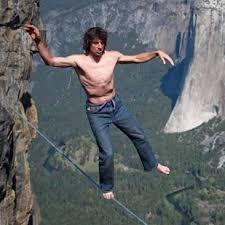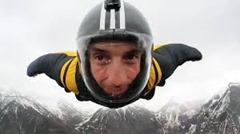You are currently browsing the tag archive for the ‘ethics’ tag.
 Dean Potter jumped off a cliff 2,286m (7,500ft) up and died. He had done this and other stunts taunting death many times; in the end death won.
Dean Potter jumped off a cliff 2,286m (7,500ft) up and died. He had done this and other stunts taunting death many times; in the end death won.
Dean is a celebrity among many people who risk their lives to base jump, climb, dive, and engage in other activities known as “extreme sports.”
I have no criticism of those who engage in extreme sports, even when like Dean they hit the wall.
I do think that his death affords an opportunity to explore an interesting distinction – that is: our culture commonly reviles people who kill themselves, but does not revile (and even honors) people who get themselves killed.
Dean Potter got himself killed, but he did not kill himself. That distinction is at the core of why folks dead people like Dean are treated heroically, even spiritually, in the media while suicides are publicly called out as “cowards.”
The legal status of killing oneself has changed in the US from being a felony in all 50 states to currently having no explicit criminal sanction, but will likely invoke State health authority.
Getting oneself killed has never been criminal, so far as I am aware, so that jumping out of an airplane, a cliff, or building is one’s own business, unless it involves trespassing.
People who get away with such activities are not treated publicly as criminals, but as celebrities.
There is something fascinating about people who risk their lives for fun and profit. In 19th century England attempted suicide was punishable by the death penalty. At the same time people paid to see performers go over waterfalls in a barrel and for Houdini to court death chained in tank of water.
profit. In 19th century England attempted suicide was punishable by the death penalty. At the same time people paid to see performers go over waterfalls in a barrel and for Houdini to court death chained in tank of water.
Perhaps the distinction is based in the intention. The serious suicide intends to kill themselves and die. The daredevil is not overtly trying to kill themselves and die, but rather to come close to death and escape its grasp.
Dean Potter did not jump off a cliff because he wanted to die. He expected to live to tell the tale of his near-death experience. He spoke of his experience of fear and his intense awareness that he might die.
It by surviving that the daredevil represents a triumph over death. We honor the risk takers because they show it possible to overcome the fears that we experience.
 Accordingly, when the risk ends in death such as Dean Potter, our sense of the risk is verified and we know that he was playing it for real.
Accordingly, when the risk ends in death such as Dean Potter, our sense of the risk is verified and we know that he was playing it for real.
I suspect that the more successful we are at preventing death by disease, accidents, and violence, as our natural life spans increase, our value for living will grow. One effect of this value is that daredevils – those who risk death – will become more special and interesting for us because they will be risking even more.
To be clear – I find daredevils fascinating and followed Dean Potter’s adventures. I am not criticizing him or other risk takers.
I do think it is relevant to re-think how we classify those who get themselves killed and those who kill themselves.
 Autonomy has been a central issue in philosophy for millennia. Traditionally it is the cluster of concepts and problems concerning Freedom, Free Will, Determinism, and Fate. Kant re-focused this conceptual cluster to the question of autonomy or “self-directedness.” The Existentialists developed this theme of self-direction into the 20th century [1.]
Autonomy has been a central issue in philosophy for millennia. Traditionally it is the cluster of concepts and problems concerning Freedom, Free Will, Determinism, and Fate. Kant re-focused this conceptual cluster to the question of autonomy or “self-directedness.” The Existentialists developed this theme of self-direction into the 20th century [1.]
Now in the 21st century we have the very real prospect of autonomous technology: robots, computers, neural nets, webs, and machines that act on their own based on environmental factors and programming. It is here now.
While the debate over genuine Artificial Intelligence (paralleled by the debate over what human intelligence is) continues, we have self-driving cars on the highways and self-flying drones over our cities and battlefields. The practical questions before us now are not “is autonomous technology possible?” but instead, “should we arm autonomous drones and tanks to kill and should we allow autonomous medical robots to prescribe and apply treatments?”
Even those questions are moot now given that Israel and South Korea have  deployed autonomous lethal guard robots. The robocat is out of the bag and we may expect an autonomous arms race to ensue from here on, perhaps until some horrible catastrophe occasions international reflection [2, 3.]
deployed autonomous lethal guard robots. The robocat is out of the bag and we may expect an autonomous arms race to ensue from here on, perhaps until some horrible catastrophe occasions international reflection [2, 3.]
For me it is hard to imagine just what would really cause us to think and act to limit autonomous weapons. After all, we in the West shrug off the assassination of an entire wedding party (17 people killed) by a drone missile [4.] Exactly what would get our attention?
I understand that some people will rise to the defense of such collateral damage. That’s not my issue here (though it is elsewhere). My interest here is in what we are individually and collectively willing to allow autonomous technology to become, even if the prospect of it’s development threatens the future of humanity as a whole.
Steve Ranger addresses these concerns in; Robots of death, robots of love: The reality of android soldiers and why laws for robots are doomed to failure [7.] His thesis is that we are creating and deploying autonomous technologies that can change our lives without our consent and we are doing so long before any level of moral reasoning is available to those machines. That is, we are enabling self-directed machines to make life and death decisions for humans when the machines have no concepts or mechanisms for recognizing and understanding the values of death and pain.
There is a rich discussion in philosophy and engineering over the conditions of safe and ethical artificial intelligence [8]. The issue at present is not AI, it is automated unintelligence. It is a lively debate over whether AI will save us or destroy us, but there much speculation needed to recognize the malicious effects of weapons programmed to kill automatically without intelligent judgment.
Pushing the dilemmas of autonomous technology further are thinkers who  question the relevance of the human species in world with autonomous artificial intelligence. James Barrat’s recent book; Our Final Invention: Artificial Intelligence and the End of the Human Era is a thoughtful analysis of such a pessimistic (for humans anyway) future [9.]
question the relevance of the human species in world with autonomous artificial intelligence. James Barrat’s recent book; Our Final Invention: Artificial Intelligence and the End of the Human Era is a thoughtful analysis of such a pessimistic (for humans anyway) future [9.]
Of course, there are plenty of fictional depictions of autonomous technologies. One of the more reflective – in a fairy tale way – is A.I. Artificial Intelligence directed by Stephen Spielberg based on a script by Stanley Kubrick [10.] I’ll be very interested in your thoughts about this film and these fascinating, in some ways disturbing, philosophical topics.
Sources
1. Buss, S. (2013). Personal Autonomy. Stanford Encyclopedia of Philosophy.
http://plato.stanford.edu/entries/personal-autonomy/
2. Shachtman, N. (2008). Israeli “Auto Kill Zone.” Wired.
http://www.wired.com/dangerroom/2008/12/israeli-auto-ki/
3. Page, L. (2007). South Korea to field gun-cam robots on DMZ. The Register.
http://www.theregister.co.uk/2007/03/14/south_korean_gun_bots/
4. Ali & King. (2013). Fatal air strike hits wedding convoy in Yemen.
http://www.latimes.com/world/worldnow/la-fg-wn-yemen-drone-strike-wedding-20131213,0,4137970.story#axzz2o358s0vm
5. Department of Defense Directive 3000.09: Autonomy in Weapon Systems. http://www.dtic.mil/whs/directives/corres/pdf/300009p.pdf
6. Yudkowsky, E. (2013). Five theses, two lemmas, and a couple of strategic implications.
http://intelligence.org/2013/05/05/five-theses-two-lemmas-and-a-couple-of-strategic-implications
7. Ranger, S. (2013). Robots of death, robots of love: The reality of android soldiers and why laws for robots are doomed to failure. TechRepublic.http://www.techrepublic.com/article/robots-of-death-robots-of-love-the-reality-of-android-soldiers-and-why-laws-for-robots-are-doomed-to-failure
8. Yampolskiy, R. and Fox, J. (2013). Safety Engineering for Artificial General Intelligence. Topoi, 32:217–226
http://link.springer.com/article/10.1007%2Fs11245-012-9128-9
9. Muehlhauser, L. (2013). Our Final Invention: Artificial Intelligence and the End of the Human Era.
http://www.kurzweilai.net/book-review-our-final-invention-artificial-intelligence-and-the-end-of-the-human-era
10. Spielberg, S. (2006). A.I. http://www.youtube.com/watch?v=sqS83f-NUww
Image acknowledgements:
Robocop, Roland Molnár, https://www.flickr.com/photos/rolandakiroland/8935247685/
M2-Catlanit002, Wikipedia
http://en.wikipedia.org/wiki/Samson_Remote_Controlled_Weapon_Station
